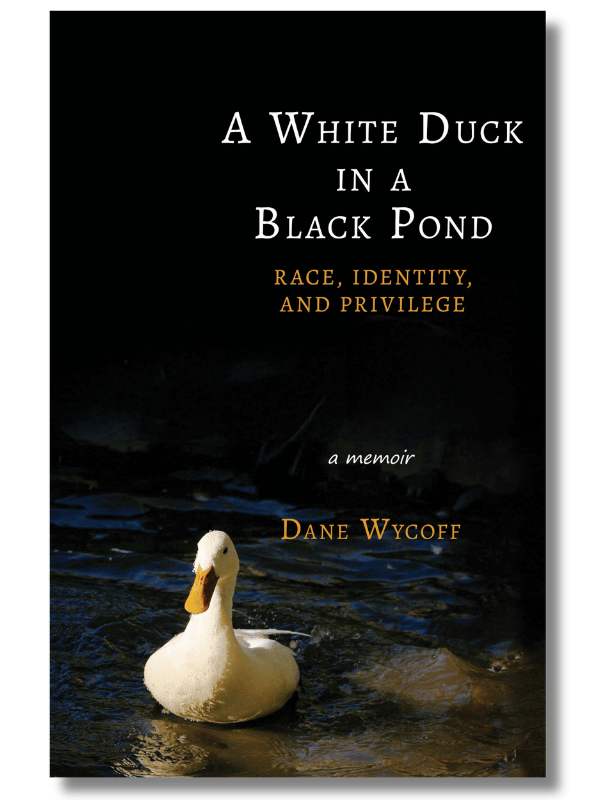A White Duck in a Black Pond
by Dane Wycoff
Genre: Nonfiction / Race
ISBN: 9798891326712
Print Length: 316 pages
Publisher: Atmosphere Press
Reviewed by Samantha Hui
A moving story about how racism transcends skin color
Dane Wycoff’s A White Duck in a Black Pond is a raw look into the nuances of racial identity and the long-lasting impact of childhood trauma and social systems of discrimination.
With unflinching honesty, Wycoff explores what it means to exist at the intersection of race, perception, and personal truth. This memoir is especially resonant for readers interested in racial identity, social justice, and the long-term psychological effects of being “othered.” Anyone drawn to memoirs that dissect the human experience with emotional depth and intellectual clarity will find Wycoff’s story both compelling and important.
“But my childhood innocence and my adulthood integrity had been confiscated by the demonic mind-control I’d been subjected to.”
The book follows Wycoff’s journey as a man who is one-quarter Black and identifies as Black, but presents as White, and suffers the consequences of that dissonance from all sides. As a child, he is raised in a predominantly Black community, yet he is punished by his peers for looking White. He is ridiculed, bullied, and manipulated into acts that compromise his values, all to earn a semblance of belonging.
Despite both his mother’s and his own repeated attempts to relocate in hopes of having a fresh start, he always finds himself ostracized by both White and Black communities. This persistent sense of alienation carries into adulthood, where Wycoff builds an impressive professional life but struggles with confidence and identity.
Even as the physical abuse fades, discrimination follows him into the workplace, where he witnesses and experiences racism firsthand. Throughout his life, he is never quite “enough” for any group, his humanity too often obscured by the projections of others.
“When forced to steal out of fear, the ethics regarding theft didn’t dawn on me. This may be the reason, at least in part, why my judgement where stealing was concerned was ethically compromised.”
The memoir is divided into ten sections that track his emotional and social evolution from early childhood to adulthood. This segmented structure works well, providing readers with clear insight into the stages of Wycoff’s personal growth.
My favorite section, titled “The Woman,” focuses on his praise for his wife, Juanita, a confident, principled feminist and activist who loves and accepts him unconditionally. Juanita is a grounding presence in the memoir, and her acceptance of Wycoff not only provides a moment of peace in his turbulent story but also becomes a catalyst for his own self-acceptance. Her presence is symbolic of what Wycoff has long sought: to be seen, known, and embraced as his whole self.
“Despite my continuing to believe myself Black, my perceived race was no longer mine alone; peer opinion had something to say about it and its words conflicted diametrically with what I wanted to hear.”
While the memoir is powerful and affecting, there are moments where its central themes become somewhat repetitive. Wycoff often reiterates his identity struggle: his assertion of Blackness against the world’s insistence on seeing him as White. Though this repetition sometimes borders on over-telling rather than showing, it also reflects the lived reality of someone who cannot escape the conversation around identity because the world refuses to let it rest. The repetition, in this light, becomes part of the point: that his difference is not something he brings up, but something constantly pointed out to him.
“Passing as White was no panacea either, and my doing so was always accompanied by a sense of conditional acceptance.”
A White Duck in a Black Pond is a brave, necessary work that invites readers to reckon with the intersectionality of racism, colorism, and identity in America. Wycoff’s story is not one of easy resolution, but of hard-won self-acceptance and understanding. This book will resonate with anyone who has felt unseen, mislabeled, or pushed to define themselves in the face of societal misunderstanding. It’s a valuable contribution to conversations on race and identity, and I would highly recommend it to educators and readers of memoirs who appreciate truth told with vulnerability and strength.
Thank you for reading Samantha Hui’s book review of A White Duck in a Black Pond by Dane Wycoff! If you liked what you read, please spend some more time with us at the links below.
The post Book Review: A White Duck in a Black Pond appeared first on Independent Book Review.
